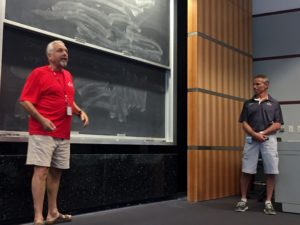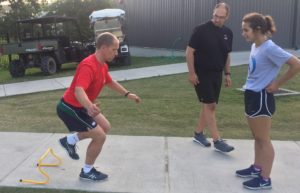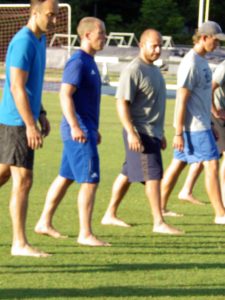Creating the Perfect Workout: Vern Gambetta and Jim Radcliffe
“We should warm up with skills not drills”
Said Jim Radcliffe in his joint presentation with Vern Gambetta at GAIN. Combined they have been on an 89 year journey and “We can do better” said Vern in trying to create the perfect workout.
This was an interesting dual presentation with a lot of back and forth. (I have quoted directly where I can remember and make general points which could have come from either presenter.)
Vern’s training mission is to make the workouts meaningful. This means paying attention to the sport and the athlete before designing sessions.
Jim starts by asking himself if the strength, speed, agility and endurance are in the Athletic Performance or out of it? For example, speed and endurance are both present in the 800m race but strength and agility are out of it. That then focusses what needs to be done in extra sessions outside of the sport itself.
He looks to increase the body wisdom of each athlete by asking them to solve movement problems. This includes developing postural control and the ability to negotiate the ground. (Someone else said at GAIN that in the battle between the athlete and the ground if the ground wins, the athlete gets injured).
Jim has previously talked about this and the importance of change of direction mechanics. What is important is setting this up within a motor learning context so that the athlete learns through decision making.
Training hard versus training smart
How much time is spent doing “Mental Toughness” (Training Hard, or “Grit” training as England Hockey call beasting people) versus improving Biomechanical Performance (Training smart).
Jim talked about eliminating negative practices from workouts: butt kicks for example in warm ups which encourage over striding.
Ask yourself “Is everything you are doing in training aligned with the stated purpose of the training program?” (I see a lot of coaches doing “stuff” in training that is a part of their sport’s folklore. When asked why it is there: “because we always do that” or “I saw team x doing it” or “we got given this kit so we use it.”
Vern said there is always a trade -off: if you add something new, something needs to go. What would you take out of your programme if you added something?
He used a brilliant analogy of a Rubik’s Cube. Children of the 1980s will remember that when trying to get one side green, you ended up messing up the red side! The human body is far more complicated than a Rubik’s Cube: so who knows what will happen if you change things repeatedly?
No perfect workout without context
For those coaches looking for “Monday’s workout” you will be disappointed. No training session or workout can or will stand alone (Goodbye WOD). Context is everything: what went before, what comes after?
Start your workout plan with a clear intent and purpose. What needs to happen to make your GOAL happen? (Having a clearly defined goal is a skill in itself).
Jim’s underpinning philosophy when working with the Oregon Ducks football team was to create “bullets not bowling balls”. They wanted to have athletes with great burst. He achieved that by doing things consistently and by eliminating redundant practices.
This is a useful reminder when planning workouts: keep coming back to “The why”.
He finished with a demonstration of his signature warm up sequence which has a specific order and is looking to improve movement, technique and tempo.
Whilst this may look like the blindingly obvious on paper, my experience coaching coaches on our courses is that this is like Rocket Science to some of them. NGB coaching qualifications that I have done (Gymnastics and my mentor Mike Euridge being the exception) simply fail to address this.
The coaches are given drills rather than taught how to think and ask questions. Asking the right questions is much more important as a coach than thinking you have the answers or “the perfect workout” in your pocket.
As I said in the previous blog, Jim as shaped my coaching practice immensely and Vern has shaped my thoughts on Athletic Development coaching through GAIN and much personal interaction. Hopefully the athletes at Excelsior ADC are benefiting (even if they don’t realise it!).





